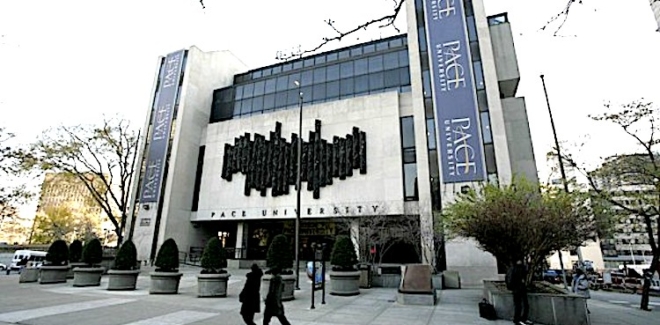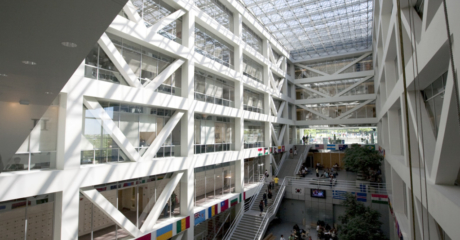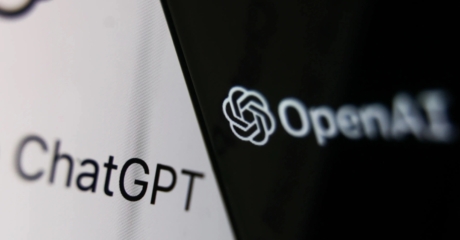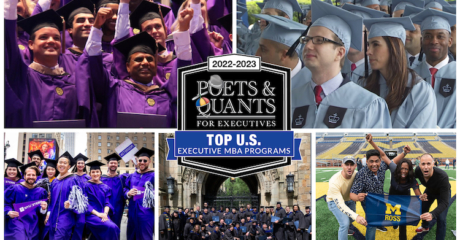Pace University’s Executive MBA is one of two in the New York region that is a blended program with combined classroom and online learning. It’s also the least expensive EMBA in New York, with a price tag of just $78,000 for a 20-month-long program loaded with a lot of project learning with real companies.
Think of it as a tightly-focused, no-frills approach. There are no electives. No concentrations. No global immersion. All the modules center on the business basics. “We do not require or even have a trip,” says Ellen Weisbord, the program’s academic director. “For some people that is a minus but for many, it is a plus. Our program is very structured with nine modules and no electives. The classes are small and people get a lot of attention.”
Pace’s Lubin School of Business requires only ten Friday-Sunday weekends at its New York City at Pace’s Downtown Conference Center at 157 William Street, in lower Manhattan over the 20 months. The cost of the program includes all tuition, textbooks, and software as well as hotel and meals during the ten-weekend residencies. In fact, your tuition covers your hotel during those residencies, even if you live two blocks away from the conference center in New York. All told, there are 34 days of face-to-face instruction in the 54-credit program. The rest of the EMBA is delivered online in nine six-credit modules that combine the weekend sessions.
A centerpiece of most modules in strategy, marketing, OB and policy–are student consulting projects with such high profile organizations as the New York Stock Exchange, Microsoft, PepsiCo, Ralph Lauren, Pepperidge Farm, Pfizer, Barnes & Noble, and AIG. “We are one of the very few EMBA programs that work with real companies to do projects as opposed to case studies,” says Weisbord. “In marketing, our students worked on an entire marketing campaign for Kraft/General Foods for the Jello brand. The class did focus groups, interviews, and mockups and at the end made a presentation to the company executives. In strategy, I led a student team to help a major retailer learn how to compete on the Internet with cannibalizing sales in their brick-and-mortar stores.”
Pace says it expects students to allocate 20 to 25 hours per week to program work during weeks without residencies, with the expectation that students would participate at least once every two days online. “The cohort is the same throughout the 20 months so for people who travel a lot or who are stay-at-home moms and dads as long as they have a computer it does not matter where they are,” adds Weisbord.
It’s a small and intimate program, with an entering class of between 12 and 15 students (the most current cohort numbers just nine EMBA candidates). Those candidates are taught by an equally small faculty group that evolves around Weisbord, a professor of management and management science.
The program begins with a five-day orientation in the fall (last year the dates were Sept. 11 through the 15th) during which students are introduced to the program’s technology and processes. The focal point of the orientation is a mini-project based on the question “Should X Buy Y?” with X and Y being two companies chosen by faculty and program alumni. Teams make a formal presentation of their findings and recommendations. “Those four days of that project are so intense they work from 9 a.m. to 9 p.m. and probably more and by the end of it they are as close to each other as you can imagine,” says Weisbord. “They become very close, and they bond. They look out for each other.”
Pace’s EMBA curriculum is among the simplest of any. It is composed of just nine courses, all of them six-credit classes, that you take one at a time: Business Strategy, Business Analysis & Statistics, Marketing, Operations Management, Organizational Behavior and Change, Finance, Public Policy, Global Strategy, and finally a capstone module with both a business simulation experience and an individual student-proposed project that can be either the creation of a business plan or a consulting assignment that addresses a company challenge or opportunity.
Pace’s EMBA is unranked by U.S. News, the Financial Times, The Economist and Poets&Quants. And Pace’s Lubin School of Business does not require a standardized test for admission. But the price of this AACSB-accredited program along with the highly flexible scheduling makes the program worth consideration.









